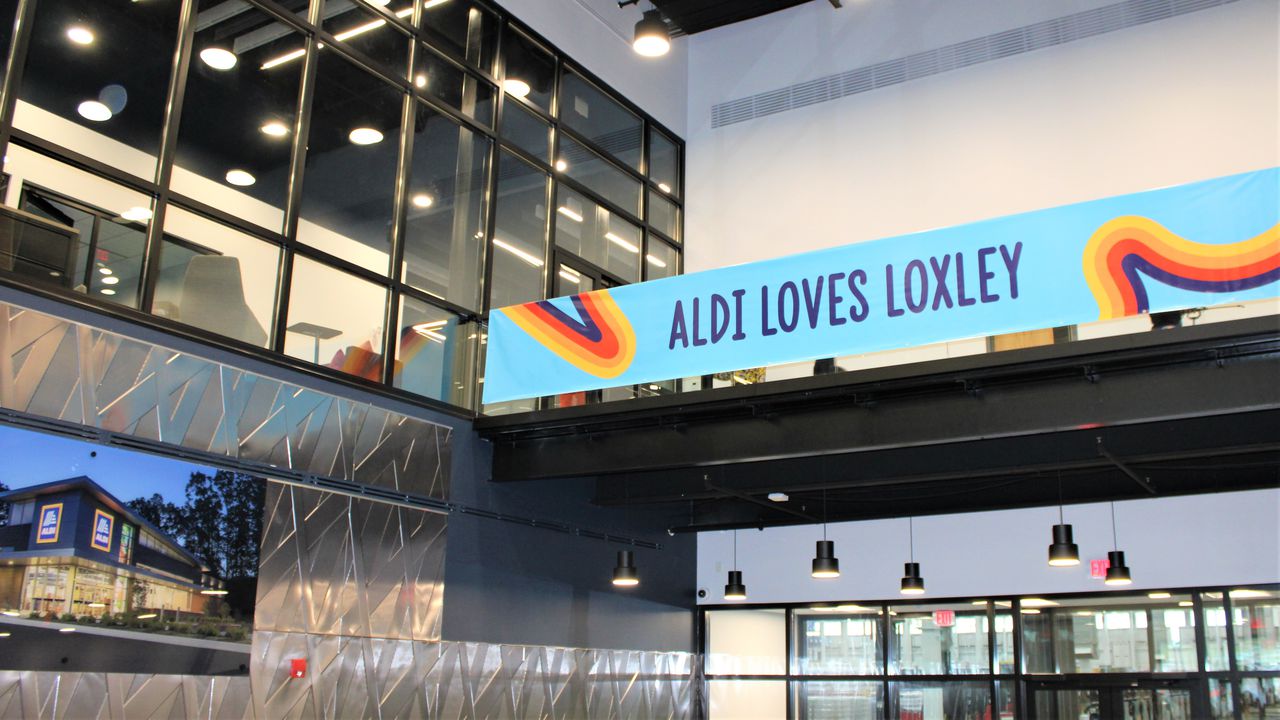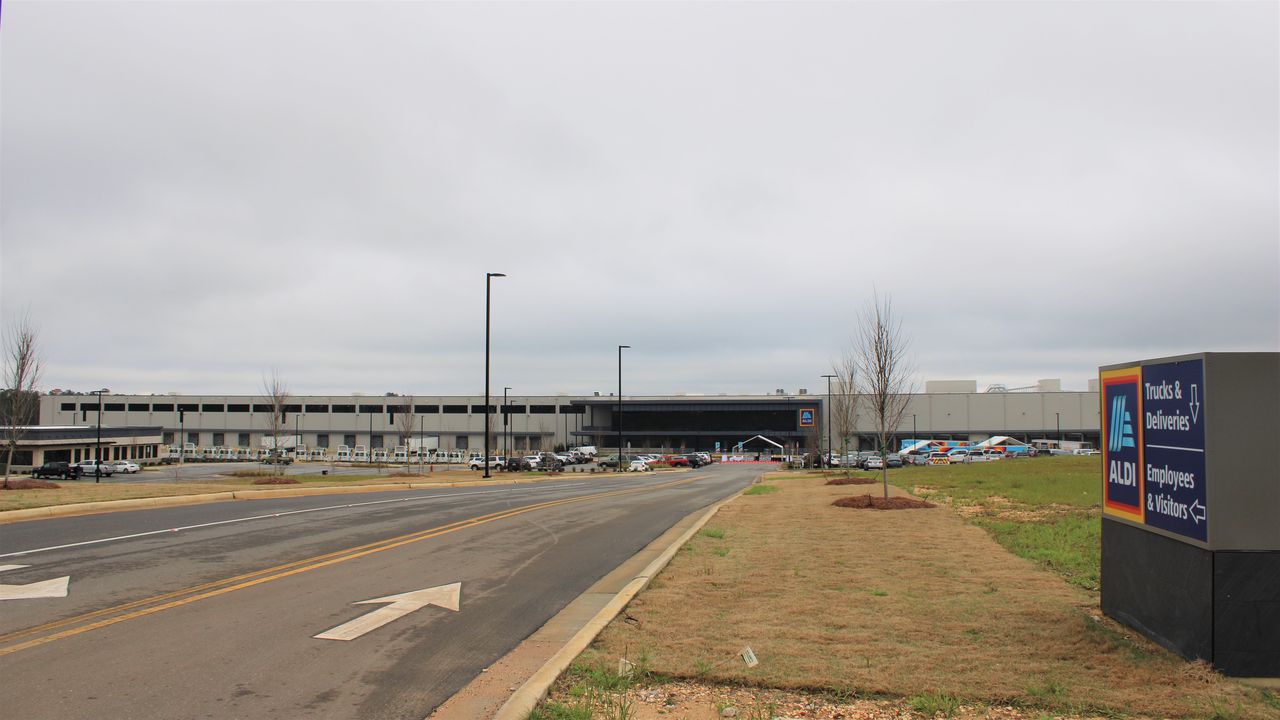Aldi opens Alabama hub that will be keystone for regional expansion
Supermarket chain Aldi officially opened a massive regional headquarters and distribution center in coastal Alabama on Tuesday, promising more stores and more jobs to come.
“At Aldi, we really try hard, and we have a very big commitment to everybody we serve to offer the best quality products at amazing prices,” said Aldi Divisional Vice President Heather Moore. “With inflation and rising food costs, we all read the news, we know that, that message is more important today than it has ever been. And that fuels our expansion throughout the U.S. We’re continuing to expand coast to coast. But this facility here is really an especially important part of that puzzle.”
The new hub will bring Aldi stores within range of “about 8 million citizens of the Gulf Coast,” Moore said.
Supermarket chain Aldi held a ribbon-cutting for a new regional headquarters and distribution center in Loxley, Ala., on Jan. 31, 2023. The center ultimately will serve about 100 stores in a region along the central Gulf Coast.Lawrence Specker | [email protected]
It has been a little over two and a half years since the chain announced its plans to build the HQ and hub in an industrial and warehousing district just north of Exit 44 on I-10, where Ala. 59 crosses the interstate. The company held a groundbreaking on the 150-acre site in February 2021, saying it represented a $100 million investment.
At the time, a company official said Aldi already had purchased 24 sites scattered from Baton Rouge to Tallahassee. Since then Aldi has opened three new stores in Mobile and two in Baldwin County, with another opening set for March in Fairhope.
Moore said the company opened 20 stores in the region in 2022 and aims to open 13 more in 2023. Aside from the nearly-complete Fairhope store, no more openings are planned this year for Mobile and Baldwin counties – though a fourth Baldwin store may be announced by year’s end, she said.
The new facility currently serves 30 stores and was designed to supply around 100, Moore said, with its territory spanning as far north as Tuscaloosa, Montgomery and Starkville, Miss. (stores north of there, including Birmingham, will continue to be served by a hub in Mt. Juliet, Tenn., she said.) The new hub is Aldi’s 26th in the United States and its sixth in the Southeast. Its warehouse side opened in July, she said, and the offices have now been completed.
“Currently we have 120 employees out here, we’ve created that many jobs, and we’re excited to keep hiring until we get to our full build-out, which will be 200 full-time positions here in Loxley,” Moore said. “And then every time we open another store, we add another 15 to 20 jobs in each one of those communities.”
Moore said Aldi’s entry into the area had featured strong support from officials at the local, county and state level. She praised officials from Gov. Kay Ivey – whose planned appearance was cancelled due to weather-related travel concerns – on down. Aldi was grateful to “everybody who helped bring this from blueprint to reality,” she said.
“I think it was three years ago when these conversations started,” she said. “We knew that when we met with the folks in Loxley, when we met with the Baldwin County reps, when we met with the state of Alabama, we knew this was going to be an amazing partnership, and we are so happy that we chose to invest our money here.”

An “Aldi loves Loxley” banner hangs inside Aldi’s new regional HQ and distribution center in coastal Alabama.Lawrence Specker | [email protected]
Among the officials who spoke was Ala. Rep. Matt Simpson, who said he’d gone from being someone who knew nothing about Aldi and its quirks – such as having patrons deposit a quarter to unlock a shopping cart – to being someone who shops there several times a week. “Now we’re Aldi people,” he said of his family.
“I want to thank you for believing in us,” he said to Moore. I want to thank you for believing in Baldwin County, for giving us your trust.”
Loxley Mayor Richard Teal likewise said he had to ask “Who is Aldi?” when the project first came up. “We had lunch over at Kravers and look what it turned out to be,” he said.
According to information previously released by the Baldwin County Economic Development Alliance, incentives received by the project include 10-year abatements of non-educational ad valorem property taxes with a value estimated at $1.3 million for Loxley, $2.09 million for Baldwin County and $770,000 for the state. An additional sales and use tax abatement is estimated at $3 million. The Alliance estimated a net benefit to schools of $8 million on non-abated ad valorem taxes and $1.5 million on sales and use taxes. It also predicts a $15 million direct impact on local tax revenue and a similar payroll impact per year.
Figures provided by the Alabama Department of Commerce add to the other incentives a jobs credit valued at $463,000 over five years and AIDT training services valued at $777,000. The state estimates its return at $8.3 million in new state revenue over 20 years and $88.3 million in new payroll over 20 years.
